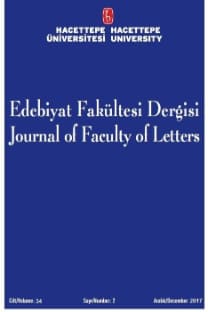Remarks on Women's Education in the Age of Enlightenment and Mademe d'Epinay
Remarks on Women's Education in the Age of Enlightenment and Mademe d'Epinay
___
- Badinter, Elisabeth, Emilie, Emilie ou I'ambition feminine au XVIIIe siecle, Flammarion, Paris,1983.
- Badinter, Elisabeth; L'Amour en plus, Paris, Flammarion, 1980.
- Badinter, Elisabeth et Robert, Condorcet, un intellectuel en politique, Gallimard, Paris, 1990.
- Du Châtelet, Madame de; Discours sur le bonheur, Edition critique par Robert Mauzi, Socie"te d'Edition "Les Belles Lettres", Paris, 1961
- Fauchery, Pierre; La Destinee feminine dans le roman europeen du dix-huitieme siecle, Armand Colin, Paris, 1972.
- Larnac, Jean; Histoire de la litterature feminine en France.Editions Kra, Paris, 1929
- Roth, Georges (e"d.), Histoire de Madame de Montbrillant: Les Pseudo-Memoires de Madame d'Epinay. Paris, Gallimard, 1951, 3 vols.
- Rousseau, Jean-Jacques, L'Emile, Gallimard, coll.La Pleiade, tome IV, 1969
- ISSN: 1301-5737
- Yayın Aralığı: 2
- Başlangıç: 1983
- Yayıncı: Emine Erdoğan Özünlü
Torus Palatinus Anomalisinin Kovuklukaya/Sinop İnsan İskeletlerindeki Sıklığı ve Olası Nedenleri
Selim Yılmaz ERDAL, Serpil EROĞLU
Hegel 'in Tarih Tasarımında Özgürlük ve İlerleme
Üniversite kütüphanelerinde toplam kalite yönetimi ve kullanıcı memnuniyeti
Vezir AKTAŞ, Fatmagül CİRHİNLİOĞLU, Bengi ÖNER ÖZKAN
Tanzimat Sonrası Osmanlı Mimarlığından Bir Kesit: Adana-Mersin Dmiryolu İstasyon Binaları
Torus Palanitus anomalisinin Kovuklukaya / Sinop insan iskeletlerindeki sıklığı ve olası nedenleri
Yılmaz Selim ERDAL, Serpil EROĞLU
Farklı Ülkelerde Çalışan Çocukların Büyüme Örüntüleri: Z-Skorlarına Dayalı bir Karşılaştırma
Kırım Tatarlarının ana vatana dönüşü ve kültürel canlanma sürecinde dil ve eğitim
Wickedness in Darkness Visible
Gadamer'in Hakikat Anlayışının İki Kaynağı ve Hermeneutik'in Görevi
